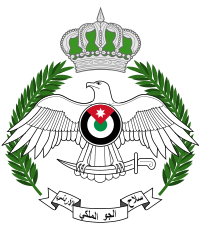The Royal Jordanian Air Force (RJAF; Arabic: سلاح الجو الملكي الأردني, Silāḥ al-Jaww al-Malakī al-ʾUrdunī) is the aerial warfare branch of the Jordanian Armed Forces. Founded in 1955,[4] the RJAF serves as the primary air defense organization in Jordan, with the mission of defending the nation’s airspace, providing ground support, and contributing to the broader national security strategy.[5] Its role has expanded over the years from purely defensive operations to include Peacekeeping,[6] humanitarian support,[7] and active participation in regional coalitions.[8]
Headquartered in Amman, the RJAF operates a variety of advanced fighter aircraft, helicopters, and transport aircraft, with bases strategically positioned across Jordan.[9] Since its establishment, the RJAF has undergone significant modernization efforts, enhancing its capabilities to address evolving security challenges.[10] The force also collaborates closely with international allies, including the United States[11] and several NATO countries, engaging in joint training exercises and defense partnerships.[12]
The RJAF has earned a respected position within the Middle East due to its skilled personnel and its contributions to stability and security in the region.[13] With a focus on training and technological advancement, the RJAF continues to enhance its readiness and operational capabilities, representing a critical component of Jordan’s defense infrastructure.[14]
- ^ International Institute for Strategic Studies (15 February 2023). The Military Balance 2023. London: Routledge. p. 335. ISBN 9781032508955.
- ^ https://www.globalmilitary.net/air_forces/jor/
- ^ "Jordanian military gets new chief". Janes. 30 July 2019. Retrieved 21 September 2019.
- ^ "Royal Jordanian Air Force History". GlobalSecurity.org. Retrieved 5 November 2024.
- ^ "Jordanian Armed Forces". Jordanian Armed Forces. Retrieved 5 November 2024.
- ^ "Jordanian Peacekeeping Missions". International Peacekeeping Journal. 2021. Retrieved 5 November 2024.
- ^ "Royal Jordanian Air Force: Humanitarian Operations". Royal Jordanian Air Force Official Site. Retrieved 5 November 2024.
- ^ "Jordan's Military Role in the Middle East". Middle East Institute. 15 July 2023. Retrieved 5 November 2024.
- ^ "Royal Jordanian Air Force Bases". GlobalSecurity.org. Retrieved 5 November 2024.
- ^ "RJAF Modernization Programs". Janes Defense. 23 August 2023. Retrieved 5 November 2024.
- ^ "US-Jordan Defense Cooperation". U.S. Department of Defense. 5 September 2023. Retrieved 5 November 2024.
- ^ "NATO and Jordan Partnership". NATO Official Website. Retrieved 5 November 2024.
- ^ "Jordanian Air Force in Regional Security". Center for Strategic and International Studies. 1 October 2023. Retrieved 5 November 2024.
- ^ "Jordan's Defense Readiness". GlobalSecurity.org. Retrieved 5 November 2024.


